On 3/12/2019, al-Zaytouna Centre for Studies and Consultations held a panel discussion entitled, “The Repercussions of the Lebanese Crisis on the Palestinian Refugees and the Ways to Overcome Them,” in which more than thirty experts on Palestinian and Lebanese affairs have participated.
The two-session discussion was full of rich content and constructive dialogue. At first, al-Zaytouna General Manager Prof. Dr. Mohsen Mohammad Saleh, welcomed the participants and talked about the Palestinian situation that had been suffering before the beginning of the Lebanese internal crisis in November 2019. For the Palestinians were living in dire economic and social conditions, which were aggravated by the decision of Labor Minister Camille Abousleiman, who increased the difficulties of working in Lebanon for Palestinian refugees.
With the onset of the Lebanese crisis, the suffering of the Palestinian refugees in Lebanon increased, where a large number of Palestinian workers lost their jobs due to the economic situation in Lebanon. Saleh warned that these conditions may severly increase the emigration of the Palestinians from Lebanon, and that these conditions may be exploited in recruiting Palestinians to serve for foreign or domestic agendas. Saleh stressed the need for Palestinians in Lebanon to distance themselves from current events, and that it is important that Lebanon remains at its best.
Jaber Suleiman, the Palestinian refugee affairs expert, explained the repercussions of the crisis on the refugees, while Dr. Shafiq Shuaib, the professor at the Lebanese University, explained how the Lebanese behaved with the refugees. On these bases, experts and specialists continued their discussions.
Panelists stressed that the current economic crisis that preceded and accompanied the protests, was a severe blow to what remains of the Palestinians’ resilience. For it occured at a time when 65% of Palestinian refugees are unemployed, and at the same time, there are concerns that the US will continue its pressure to implement the “deal of the century.”
Secondly, the US continue its pressure to implement the “deal of the century” and endeavor to settle the remainder of the Palestinians in Lebanon, aiming to close the refugees’ dossier. Thirdly, the state of poverty, misery, frustration and closed doors in the face of the Palestinian refugees may lead to the speed of the social and psychological problems, and ethical and behavioral perversion, expressed by joining radical elements. Fourthly, some of these may try to take advantage of the people’s conditions to enlist unemployed youth to work for their agendas, or use them as fuel in internal and external battles; noting that the Palestinians have shown great awareness by distancing themselves from the Lebanese internal affairs.
The panelists expressed the need to increase the attention of the Arab and Muslim countries, in addition to the international community to alleviate the suffering of the Palestinian refugees in Lebanon. This requires at least an urgent emergency system to cope with the thousands of families crushed by extreme conditions. What is required of UNRWA is to mobilize its efforts and call on donors to provide emergency aid to refugees, in the amount that covers their needs for at least six months. Charities concerned with the affairs of Palestinians in Lebanon must quickly present specific projects to Arab, Islamic and international charities, in order to support them; such as the food basket for the poor projects, medical relief projects, and covering the costs of education, productive projects, orphans sponsorship and others. It must be noted that supporting the Palestinians of Lebanon is not just a case of humanitarian support, rather it is a matter of supporting the steadfastness of one of the most important Palestinian refugee communities. It is a necessary support to face the “deal of the century” and the plots of “resettlement” and displacement.
Furthermore, Furthermore, the severe blows to the Palestinian communities in Iraq and Syria (and prior to that in Libya) increase the importance and vitality of preserving Palestinian presence in Lebanon.
The panelists made the following recommendations:
• The need to establish an economic safety net to support the Palestinian refugees in Lebanon.
• The need to form a joint Palestinian-Lebanese committee to explain the demands and suffering of the Palestinian refugees in Lebanon, to various Lebanese parties.
• To pressure various bodies and organization, which are responsible for the Palestinian situation in Lebanon, to double their activities in the current phase, such as: UNRWA, charities, Palestinian political organizations and parties.
• The need to conduct studies and statistics on the Palestinian situation in Lebanon, and provide them to Arab, Islamic and international organizations, in order to guide and activate economic assistance to Palestinian refugees in Lebanon.
• The importance of raising awareness by holding various political and mobilization initiatives, and not wait for the Lebanese media. This requires dozens of media professionals, researchers and specialists to be involved, in order to present the Palestinian position and the Palestinian suffering in a scientific thoughtful manner to the Lebanese and non-Lebanese media.
• Activating the role of Palestinian social solidarity, by identifying the needs and requirements of Palestinian society in the current and future phase.
• The need to increase the financial support of Palestinian productive projects, and encourage the granting of soft loans by Palestinian societies and organizations to the Palestinian refugees. For this would support the Palestinians’ resilience and improve their economic situation.
• The need to reintegrate the Palestinian element into the Lebanese economic system, by the re-enactment of Lebanese laws and legislations that facilitate Palestinian involvement in the Lebanese economic cycle. In addition to the need to benefit from Palestinian experts and businesspersons.
• The discussion concerning the Palestinian situation in Lebanon and its improvement must be considered a primary Lebanese interest. For it affects the stability of Lebanon, and prevents the exploitation of the suffering of the Palestinian refugees, who might be used in the game of Lebanese polarization.
| Click here to download: >> Report: Panel Discussion: The Repercussions of the Lebanese Crisis on the Palestinian Refugees and the Ways to Overcome Them |



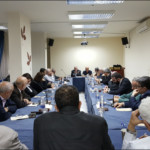
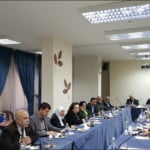
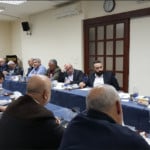
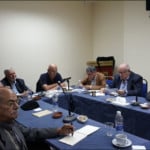
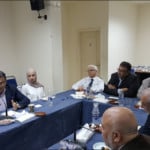

Leave A Comment